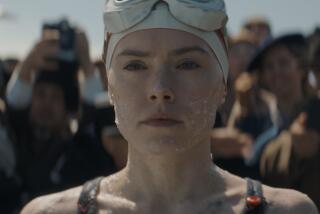Ripple effect
Told from the viewpoint of a young Hungarian girl whose mother has left for the West in 1956, “The Swimmer” is the story of children left like bobbing corks on a sea of adult whim with the world in turmoil around them.
“Something had happened in Budapest,” says young Kata, describing the October revolution that was stopped by Soviet tanks. “[T]hey had smashed stone heads, stomping on the shards; shots had been fired, too many shots; on the radio they had appealed to the world, but the world ignored us as if it had not heard, as if radio had been invented, but not for us.”
Dire consequences loomed for a Hungarian family if one of its members left for the West. Zsuzsa Bank’s first novel acutely imagines the children and husband left behind. “We won’t run after someone who deserted us, Isti and I said,” Kata explains about herself and her brother, “and we said it not because we meant it but because we wanted to mean it, and the more often we said it, we thought, the sooner we’d be able to believe it. What belonged to us and what we thought we knew was little enough, and to give that little up was impossible.”
The young girl carefully watches the accidents of their life, a life of being dragged across Hungary by her disoriented father Kalman who, working odd jobs, takes pleasure only in swimming (in reality and in his mind). We follow their movement between relatives, friends and acquaintances and enter a sort of timeless child world in which nothing happens except observation and waiting.
“He would throw his cigarettes on the ground and stamp out the glowing tips and when he lay on the sofa we could see white paper dots on the soles of his shoes,” Kata observes of her father. Or, looking at the hands of an old man, she says, “I stared at the veins on his hands which looked like fat green worms.” There is the wonderful unpretentious wisdom of children in these pages. When Isti detects a sad emptiness in the life of one person they are staying with, he struggles to make sense of an experience beyond his reality. This emptiness, he says, has a sound “like stones slipping down a slope.”
The children come of age in the shuffle between houses, and the novel ends 12 years later as Czechoslovakia’s Prague Spring begins (though Bank doesn’t exploit the irony of bookending the story with such momentous events). At a ferry dock, the narrator says, people “were saying that in Prague someone set himself on fire now when everything was supposed to have been over long ago.”
Born in 1965 in Frankfurt, Germany, Bank is the child of Hungarian refugees. She artfully allows the reader to gather together the story, much as the children gather together the story of the life their mother is leading in the West: a life composed of a series of dreary menial jobs, the usual fate of many refugees. No case is being argued, no thesis elaborated about life in those gray days -- “The Swimmer’s” greatest strength is in imagining what happens to those left in the wake of a mother’s desertion. *
More to Read
Sign up for our Book Club newsletter
Get the latest news, events and more from the Los Angeles Times Book Club, and help us get L.A. reading and talking.
You may occasionally receive promotional content from the Los Angeles Times.









